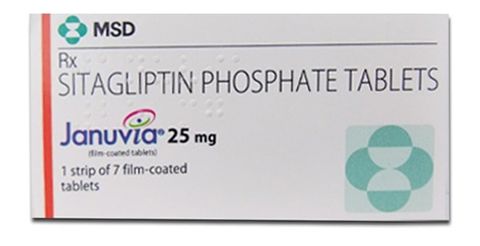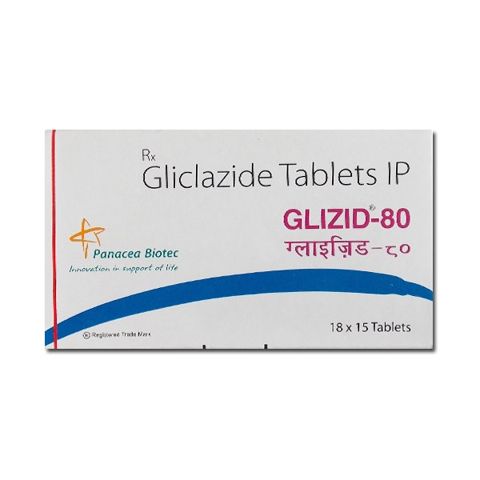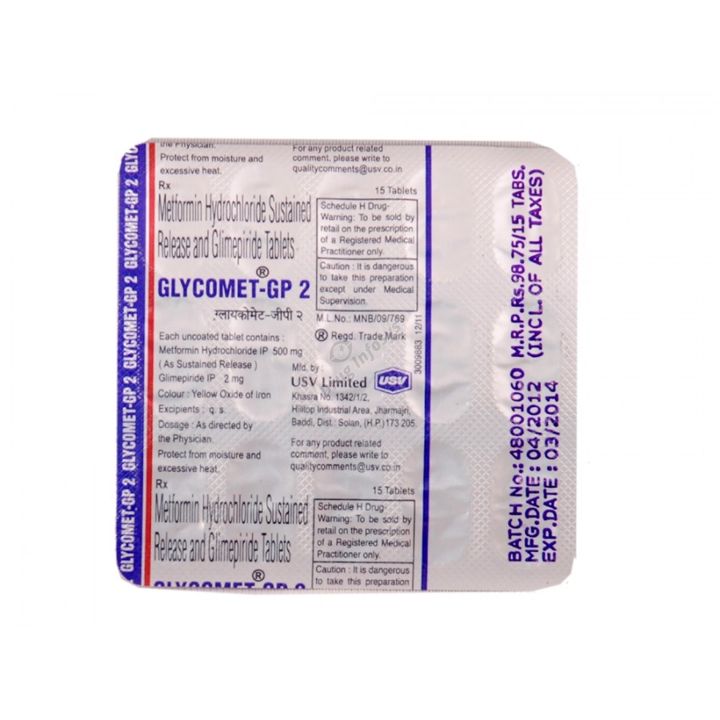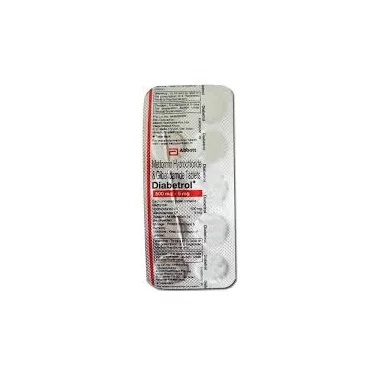Januvia 25 mg
Januvia 25 mg tablet is a medication commonly prescribed to manage blood sugar levels in individuals with type 2 diabetes. The active ingredient in Januvia is sitagliptin, which belongs to a class of drugs known as dipeptidyl peptidase-4 (DPP-4) inhibitors. Individuals with type 2 diabetes often struggle with maintaining proper blood sugar control due to issues with insulin resistance and decreased insulin production. Januvia works by enhancing the body's ability to regulate blood sugar levels by targeting the DPP-4 enzyme, which plays a role in the breakdown of certain hormones that influence insulin release. By inhibiting this enzyme, Januvia helps increase insulin secretion and decrease the production of glucagon, a hormone that raises blood sugar levels. The 25 mg dosage of Januvia is typically used as a starting dose for many patients. However, dosages can be adjusted based on individual response and healthcare provider recommendations. It is important to take Januvia as prescribed and to follow a healthy diet and exercise regimen as part of a comprehensive diabetes management plan.
What is Januvia 25 mg?
Januvia 25 mg is a medication commonly used to treat type 2 diabetes. The active ingredient in Januvia is sitagliptin, which belongs to a class of drugs known as dipeptidyl peptidase-4 (DPP-4) inhibitors. These medications work by increasing the levels of certain hormones in the body that stimulate the pancreas to produce more insulin and reduce the amount of glucose produced by the liver. Januvia is often prescribed as part of a comprehensive treatment plan for people with type 2 diabetes, which may include dietary changes, exercise, and possibly other medications. It's important to note that Januvia is not used to treat type 1 diabetes or diabetic ketoacidosis. The dosage of Januvia can vary depending on individual circumstances, and your doctor will determine the appropriate dose for you. The 25 mg strength refers to the amount of sitagliptin in each tablet. It's crucial to take the medication as prescribed by your healthcare provider and to closely monitor your blood sugar levels while on Januvia.
What is it used for?
Januvia (generic name: sitagliptin) is a medication used to treat type 2 diabetes. It has a place with a class of medications known as dipeptidyl peptidase-4 (DPP-4) inhibitors. Januvia helps lower blood sugar levels in individuals with type 2 diabetes by increasing the levels of certain natural substances in the body that regulate insulin and blood sugar. Specifically, Januvia works by inhibiting the action of DPP-4 enzymes, which break down incretin hormones. Incretin hormones stimulate the release of insulin from the pancreas and reduce the amount of glucose produced by the liver after eating. By inhibiting DPP-4, Januvia helps to increase the availability and effectiveness of these incretin hormones, leading to better blood sugar control. Januvia is typically used in conjunction with a healthy diet and regular exercise to manage blood sugar levels in people with type 2 diabetes. The dosage may vary depending on an individual's specific needs, and it's essential to follow a healthcare provider's recommendations closely when using this medication. Additionally, Januvia may be prescribed alone or in combination with other diabetes medications to achieve optimal blood sugar control.
What do you need to know before you take a Januvia25 mg Tablet?
Before taking Januvia 25 mg tablets, there are several important factors you should be aware of. It's important to consult with your healthcare provider or doctor before starting any new medication. Here are some things you should consider:
Clinical History: Illuminate your medical services supplier about your total clinical history, including any current ailments, sensitivities, or past antagonistic responses to meds.
Current Medications: Provide a list of all the medications you are currently taking, including prescription drugs, over-the-counter medications, vitamins, and supplements. This is important to prevent potential interactions between Januvia and other drugs.
Pregnancy and Breastfeeding: If you are pregnant, planning to become pregnant, or breastfeeding, discuss the risks and benefits of taking Januvia with your healthcare provider. It's important to manage blood sugar levels during pregnancy, but the safety of Januvia during pregnancy and breastfeeding should be assessed.
Kidney Function: Januvia is primarily excreted through the kidneys, so it's crucial to assess your kidney function before starting treatment. If you have impaired kidney function, your healthcare provider may need to adjust the dosage or consider an alternative treatment.
Liver Function: Although Januvia is not significantly metabolized by the liver, inform your healthcare provider if you have liver problems, as this may influence the decision to prescribe Januvia.
Allergies: If you have a known allergy to sitagliptin (the active ingredient in Januvia) or any other components of the tablet, you should not take Januvia.
Pancreatitis: Inform your healthcare provider if you have a history of pancreatitis, as there have been rare cases of pancreatitis reported with the use of Januvia.
Alcohol: Discuss alcohol consumption with your doctor, as it may interact with the medication or impact your blood sugar levels.
Hypoglycemia (Low Blood Sugar): Januvia is less likely to cause hypoglycemia on its own, but if you are also taking other medications that lower blood sugar or if you have a history of hypoglycemia, it's important to be cautious.
Dosing Instructions: Follow the dosing instructions provided by your healthcare provider. Januvia is normally taken once day to day, regardless of food. Try not to change the portion or quit taking the medicine without speaking with your primary care physician..
Side Effects: Be aware of potential side effects, which can include upper respiratory tract infections, headaches, and stomach discomfort. Assuming you experience any surprising or extreme secondary effects, contact your medical services supplier.
Possible side effects
Januvia (generic name: sitagliptin) is a medication commonly used to treat type 2 diabetes. It belongs to a class of drugs called DPP-4 inhibitors, which work by increasing the levels of certain hormones that stimulate the pancreas to produce more insulin and reduce the amount of glucose produced by the liver. Januvia is often prescribed in various dosages, including 25 mg.
Common side effects of Januvia 25 mg can include:
Upper Respiratory Tract Infection: Symptoms like a runny or stuffy nose, sore throat, cough, and headache might occur.
Migraine: A few people might encounter gentle to direct cerebral pains.
Nausea: Feelings of queasiness or an upset stomach may occur, particularly when starting the medication.
Stomach Upset: This might include symptoms like abdominal discomfort, diarrhea, or indigestion.
Hypoglycemia (Low Blood Sugar): Although less common, taking Januvia in combination with other diabetes medications can increase the risk of hypoglycemia. Symptoms may include shakiness, sweating, confusion, rapid heartbeat, and dizziness.
Joint or Muscle Pain: Some people might experience pain in their joints or muscles.
Allergic Reactions: While rare, allergic reactions such as skin rash, itching, or swelling of the face, lips, or tongue can occur. Severe allergic reactions like anaphylaxis are extremely rare but require immediate medical attention.
Pancreatitis: In rare cases, Januvia has been associated with pancreatitis (inflammation of the pancreas). Side effects can incorporate extreme stomach agony, sickness, and retching. Assuming you experience these side effects, look for clinical consideration speedily.
Kidney Issues: Januvia can affect kidney function in some individuals, particularly those with pre-existing kidney problems. Monitoring kidney function may be necessary.
Benefits of Januvia 25 mg tablet
Januvia (generic name: sitagliptin) is a prescription medication primarily used to treat type 2 diabetes. The 25 mg tablet is one of the dosage strengths available for this medication. Here are some potential benefits of Januvia 25 mg tablet:
Blood Sugar Control: Januvia works by inhibiting an enzyme called dipeptidyl peptidase-4 (DPP-4), which increases the levels of certain hormones that stimulate the release of insulin and reduce the production of glucagon. This helps regulate blood sugar levels, thus aiding in the management of diabetes.
Convenience: The 25 mg tablet provides a lower dosage option for patients who may require a smaller dose due to factors like age, kidney function, or other medical conditions. It allows for more precise dosing based on individual needs.
Minimal Risk of Hypoglycemia: Januvia typically carries a lower risk of causing hypoglycemia (low blood sugar) compared to some other diabetes medications. This can be particularly beneficial for patients who are at higher risk of experiencing hypoglycemic episodes.
Weight Neutrality: Januvia is considered to be weight-neutral, meaning it is less likely to lead to weight gain. This can be advantageous for individuals who are concerned about weight management as part of their diabetes management plan.
Kidney Function Preservation: Januvia is generally well-tolerated in individuals with kidney issues, and its dosage may need to be adjusted based on kidney function. The 25 mg dosage can be helpful for those with compromised kidney function while still achieving blood sugar control.
Combination Therapy: Januvia can be used alone or in combination with other diabetes medications. It may be prescribed alongside other oral antidiabetic agents or insulin to achieve better blood sugar control.
Cardiovascular Benefits: Some studies suggest that Januvia might have cardiovascular benefits, such as reducing the risk of heart-related complications in patients with type 2 diabetes. Notwithstanding, it's critical to talk with a medical care supplier for customized exhortation.
Once-Daily Dosing: The convenience of once-daily dosing with Januvia can simplify medication regimens and improve medication adherence.
Reduced Fasting Blood Sugar Levels: Januvia has been shown to reduce fasting blood sugar levels, which is particularly important for overall diabetes management.
How does Januvia 25 mg tablet work? H2
Januvia (generic name: sitagliptin) is a medication used to manage type 2 diabetes. It has a place with a class of medications called dipeptidyl peptidase-4 (DPP-4) inhibitors. Januvia 25 mg tablets work by targeting a specific enzyme in the body known as DPP-4.
Here's how Januvia works:
Regulation of Blood Sugar Levels: After you eat, your body breaks down the food into various nutrients, including sugars. These sugars enter your bloodstream, causing your blood sugar levels to rise. In a healthy individual, the body releases insulin, a hormone that helps cells absorb and use the sugar for energy. In type 2 diabetes, this process doesn't work effectively, leading to elevated blood sugar levels.
Role of DPP-4: DPP-4 is an enzyme that breaks down incretin hormones, such as GLP-1 (glucagon-like peptide-1). These chemicals assume a pivotal part in directing glucose levels.GLP-1 helps increase insulin secretion from the pancreas, reduces the production of glucose in the liver, and slows down the absorption of sugar from the gut.
DPP-4 Inhibition: Januvia works by inhibiting (blocking) the activity of the DPP-4 enzyme. By doing so, it increases the levels of active GLP-1 in the body. This has several beneficial effects on blood sugar control:
Increased Insulin Release: Januvia encourages the pancreas to release more insulin in response to elevated blood sugar levels. This helps lower blood sugar by promoting the uptake of sugar into cells for energy.
Reduced Glucagon Release: Januvia also helps suppress the release of glucagon, a hormone that prompts the liver to release stored glucose into the bloodstream. By reducing glucagon release, Januvia lowers the amount of excess glucose being released by the liver.
Slower Digestion and Absorption: Januvia helps slow down the digestion and absorption of glucose from the digestive tract into the bloodstream. This further aids in maintaining stable blood sugar levels after meals.
Overall, Januvia helps to improve blood sugar control by increasing insulin secretion, decreasing glucagon release, and slowing down the absorption of glucose. It is important to note that Januvia is usually prescribed as part of a comprehensive treatment plan that may include lifestyle changes, diet, exercise, and possibly other medications, all tailored to the individual's specific needs and health condition. It's important to follow your healthcare provider's instructions and regularly monitor your blood sugar levels while taking Januvia or any other diabetes medication.
How to store Januvia 25 mg?
Storing Januvia 25 mg (sitagliptin) or any medication properly is essential to ensure its effectiveness and safety. Here are some guidelines for storing Januvia 25 mg: H5
Keep in Original Container: Store Januvia in its original container or packaging. The packaging is designed to protect the medication from light, moisture, and contaminants.
Temperature: Store Januvia at room temperature, ideally between 68°F to 77°F (20°C to 25°C). Avoid extreme temperatures, such as freezing or excessive heat, which can affect the medication's stability.
Moisture: Keep the medication away from excessive moisture. Do not store it in the bathroom, where humidity levels can fluctuate.
Light: Protect Januvia from direct sunlight and strong artificial light. A cool, dark place like a medicine cabinet or a drawer is ideal.
Childproofing: Ensure that the medication is stored in a childproof container or in a location out of reach of children and pets. Januvia should not be accessible to anyone other than the intended patient.
Expiry Date: Check the lapse date on the prescription bundling. Do not use Januvia if it has expired.
Keep It Dry: If you live in a humid climate, you might consider using a desiccant or moisture-absorbing packets to help keep the medication dry. Just be sure to keep these packets away from children and pets.
Medication Information: Always keep the package insert or prescription information with the medication for reference.
Traveling: If you need to travel with Januvia, carry it in its original packaging, and store it in a cool, dry place. If you're flying, consider keeping it in your carry-on bag to avoid temperature extremes in the cargo hold.
Dispose of Properly: When you no longer need Januvia or it has expired, dispose of it properly. Try not to wash it away for good or toss it in the junk. Check your local regulations for medication disposal, as there may be designated drop-off locations or programs for safe disposal.
Warnings and precautions
I can provide you with general information about Januvia (sitagliptin) 25 mg, including its warnings and precautions. However, please note that you should always consult a healthcare professional or read the medication's package insert for the most accurate and up-to-date information. Here are some common warnings and precautions associated with Januvia 25 mg:
Warnings:
Hypoglycemia (Low Blood Sugar): Januvia is usually not associated with causing low blood sugar on its own, but when used in combination with other diabetes medications like insulin or sulfonylureas, the risk of hypoglycemia increases. Symptoms of low blood sugar include dizziness, shakiness, sweating, confusion, and rapid heartbeat.
Pancreatitis: There have been rare reports of pancreatitis (inflammation of the pancreas) in people using Januvia. Inform your doctor if you experience severe abdominal pain, which could be a sign of pancreatitis.
Allergic Reactions: Allergic reactions, including skin reactions and severe joint pain, have been reported with Januvia. Seek medical attention if you develop a rash, itching, swelling, or have difficulty breathing.
Kidney Function: Januvia is eliminated from the body primarily through the kidneys. Assuming that you have kidney issues, your PCP might have to change your portion. Regular monitoring of kidney function is recommended.
Precautions:
Kidney Impairment: If you have moderate to severe kidney impairment, your doctor may adjust the dose of Januvia or consider an alternative medication. This is to prevent the accumulation of the drug in the body.
Liver Impairment: Although Januvia is primarily metabolized in the liver, it is not extensively metabolized and is unlikely to cause significant interactions with liver impairment. However, caution is still advised, especially if there are other medications affecting liver function.
Pregnancy and Breastfeeding: Januvia should be used during pregnancy only if clearly needed. It is not known whether Januvia passes into breast milk, so consult your doctor before using it while breastfeeding.
Heart Failure: There have been cases of heart failure reported, particularly in patients with a history of heart disease. Inform your doctor if you have heart problems or experience symptoms like shortness of breath or swelling.
Drug Interactions: Inform your healthcare provider about all the medications you are taking, including prescription, over-the-counter drugs, and herbal supplements. Certain medications may interact with Januvia, potentially affecting its effectiveness or causing side effects.
Alcohol: Limit alcohol consumption while taking Januvia, as it can increase the risk of hypoglycemia.
Drug interactions
Januvia (generic name: sitagliptin) is a medication commonly used to treat type 2 diabetes. It belongs to a class of drugs called dipeptidyl peptidase-4 (DPP-4) inhibitors, which work by increasing the levels of incretin hormones in the body. These hormones help regulate blood sugar levels by increasing insulin secretion and decreasing the production of glucagon. When taking any medication, including Januvia, it's important to be aware of potential drug interactions. Drug interactions can affect how medications work in the body and may lead to unwanted side effects or reduced effectiveness. Here are some notable drug interactions involving Januvia 25 mg:
Other Diabetes Medications: Combining Januvia with other diabetes medications (like insulin, sulfonylureas, meglitinides, etc.) might increase the risk of hypoglycemia (low blood sugar). Dose adjustments might be needed to avoid this.
Medications That Affect Kidney Function: Since Januvia is primarily eliminated through the kidneys, drugs that affect kidney function can impact its clearance. Drugs like certain antibiotics and nonsteroidal anti-inflammatory drugs (NSAIDs) can potentially increase the concentration of Januvia in the body.
ACE Inhibitors and Angiotensin Receptor Blockers (ARBs): These medications are commonly used to treat high blood pressure and heart conditions. There have been reports of increased risk of hypotension (low blood pressure) when Januvia is used in combination with ACE inhibitors or ARBs.
Digoxin: Januvia has the potential to interact with digoxin, a medication used for heart conditions. Co-administration might affect digoxin levels in the body, requiring close monitoring.
Rifampin: Rifampin, an antibiotic used to treat tuberculosis and other infections, can potentially reduce the effectiveness of Januvia. Dose adjustments might be necessary.
Cyclosporine: Cyclosporine, an immunosuppressant used in transplant patients, could potentially affect the metabolism of Januvia, leading to altered drug levels.
Medications Affecting Stomach pH: Some medications that alter stomach pH, like antacids or proton pump inhibitors (PPIs), might affect the absorption of Januvia. It's advisable to take Januvia at least an hour before taking these medications.
Certain Antibiotics: Some antibiotics, particularly quinolones and tetracyclines, could potentially interfere with the absorption of Januvia. It's recommended to take Januvia a few hours before or after taking these antibiotics.
Patient counseling information
Patient Counseling Information for Januvia (Sitagliptin) 25 mg:
1. Medication Use:
Januvia is a medication used to treat type 2 diabetes. It helps lower blood sugar levels by increasing the release of insulin and reducing the amount of glucose produced by the liver.
2. Dosage:
Take Januvia exactly as prescribed by your healthcare provider.
The usual dose is 25 mg once daily. Follow your doctor's instructions regarding when to take it, with or without food.
3. Compliance:
Consistency in taking Januvia is important for its effectiveness. Do not skip doses.
4. Monitoring:
Your doctor will monitor your blood sugar levels regularly to adjust the dosage if necessary.
5. Hypoglycemia (Low Blood Sugar):
Januvia is unlikely to cause low blood sugar on its own, but if you're taking it in combination with other diabetes medications, hypoglycemia might occur.
Be aware of the symptoms of low blood sugar, such as shakiness, sweating, dizziness, rapid heartbeat, and confusion.
6. Side Effects:
Common side effects include upper respiratory tract infections, headache, and stomach upset. These are usually mild and temporary.
Assuming that you experience any extreme or industrious aftereffects, contact your primary care physician.
7. Hypersensitive Responses:
Look for clinical consideration right away on the off chance that you experience indications of a hypersensitive response, like rash, tingling, expanding, extreme dazedness, or trouble relaxing.
8. Safety measures:
Illuminate your PCP about some other prescriptions, enhancements, or medical issue you have, as Januvia might cooperate with specific medications.
Inform your primary care physician as to whether you're pregnant, intending to become pregnant, or breastfeeding.
9. Way of life:
Follow a sound eating regimen and work-out daily schedule as suggested by your primary care physician.
Screen your glucose levels routinely as prompted.
10. Missed Portion:
On the off chance that you miss a portion, accept it when you recall. On the off chance that it's near the ideal opportunity for your next portion, skirt the missed portion and go on with your normal timetable.
Conclusion
Januvia (sitagliptin) 25 mg is a medicine usually recommended for the treatment of type 2 diabetes. It has a place with a class of medications called dipeptidyl peptidase-4 (DPP-4) inhibitors. The main role of Januvia is to assist control glucose levels in people with type 2 diabetes by expanding the degrees of incretin chemicals in the body. These chemicals invigorate the arrival of insulin and decrease the creation of glucose by the liver. All in all, Januvia 25 mg can be a successful apparatus in overseeing glucose levels for individuals with type 2 diabetes. Be that as it may, it's fundamental to utilize this medicine as a component of a far reaching diabetes board plan, which might incorporate dietary changes, work out, and different drugs as recommended by a medical care proficient. Likewise with any medicine, there can be possible secondary effects and connections, so it's urgent to talk with a clinical supplier prior to beginning or making changes to any treatment routine. Normal observing and circle back to a medical care group are indispensable to guarantee the drug's viability and address any worries that might emerge.
Your review is submitted successfully. It will be live after approval, and it takes up to 24 hrs.







